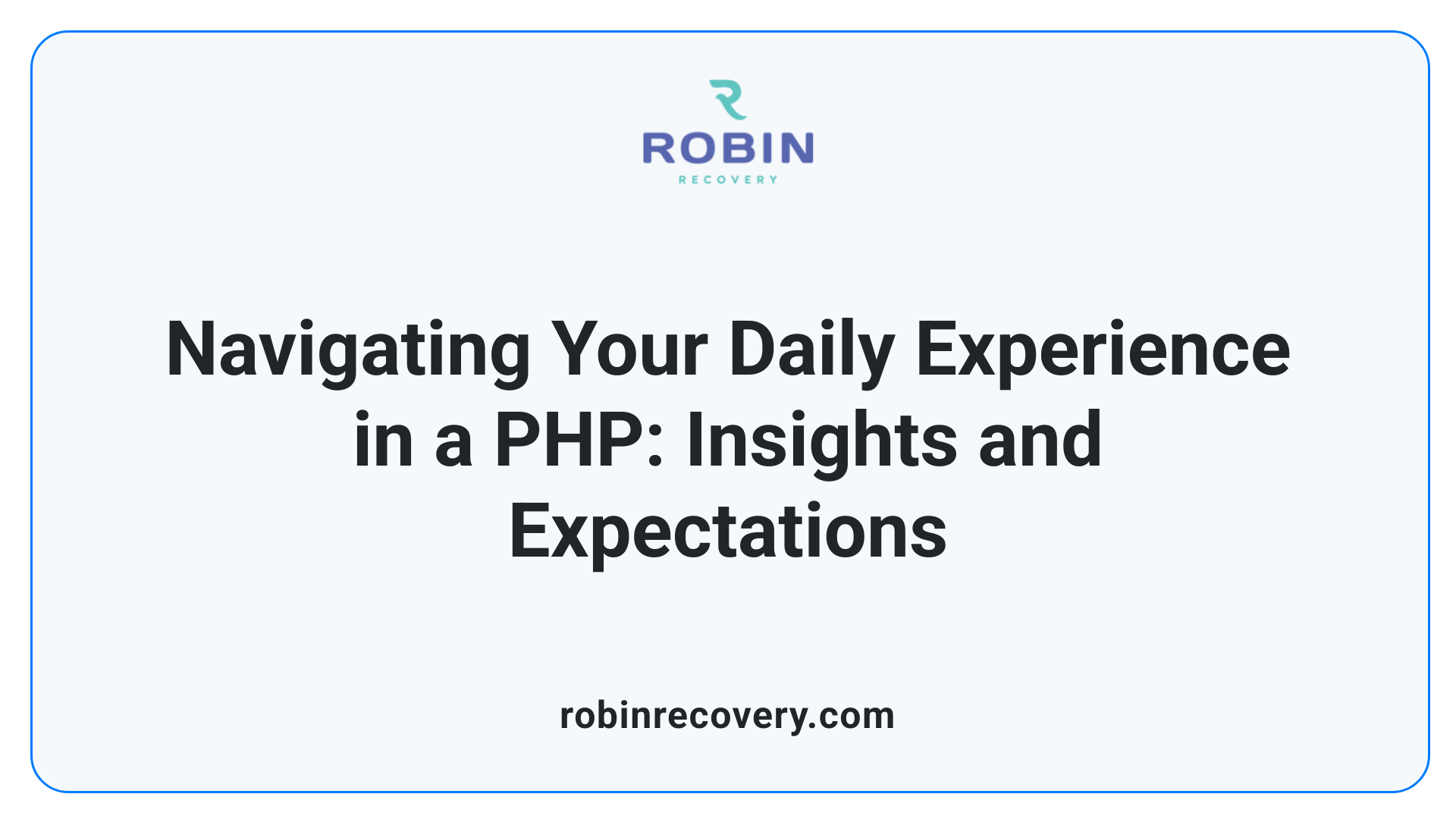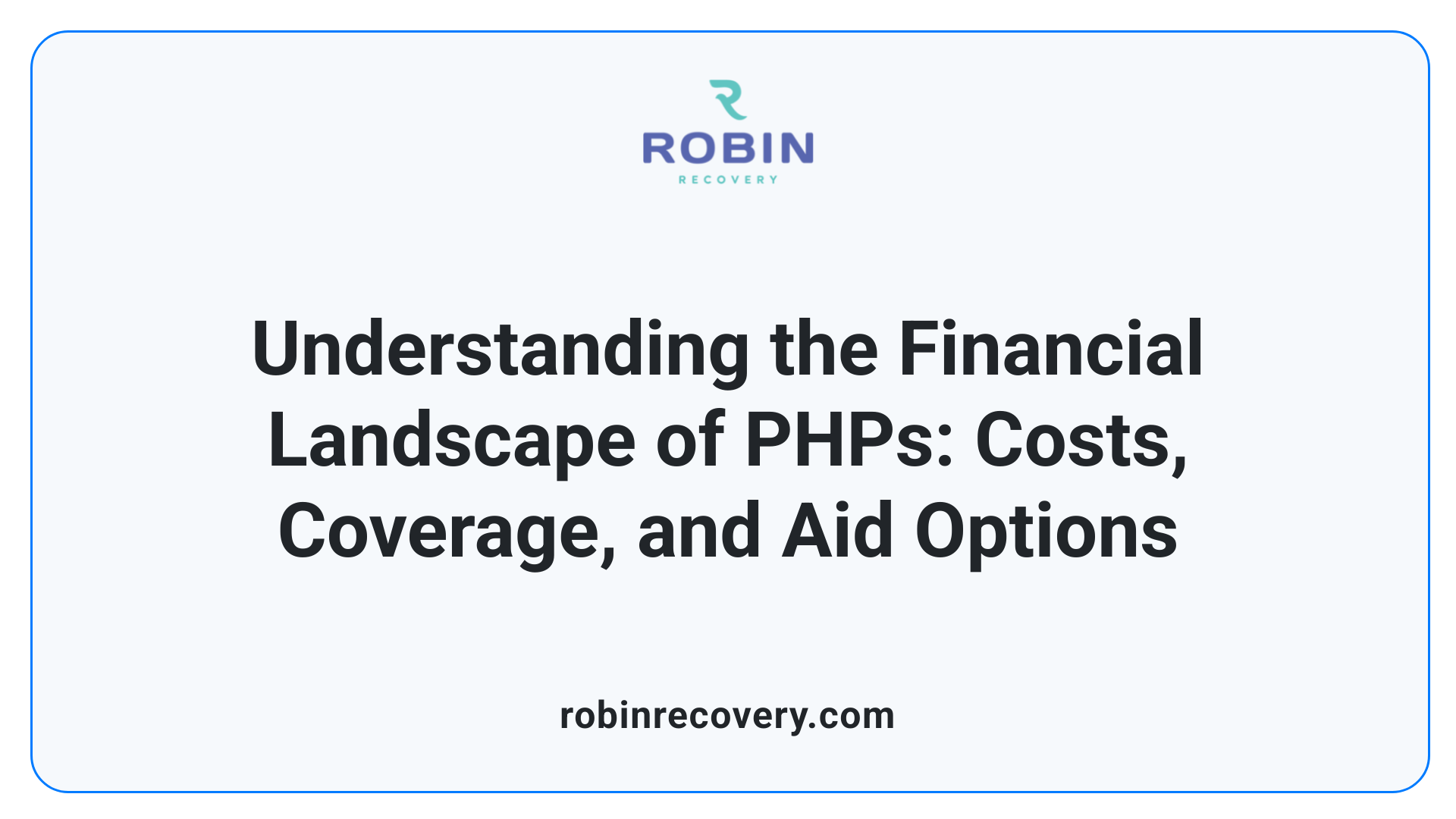What to Expect During a Partial Hospitalization Program (PHP)

Understanding the Landscape of PHP
Partial Hospitalization Programs (PHP) offer a unique blend of structured mental health care and personal comfort, allowing individuals to receive comprehensive treatment without the need for overnight stays. As an intermediate step between inpatient and outpatient care, PHPs cater to those requiring intensive support to manage conditions like depression, anxiety, and substance use disorders. Here, we'll delve into what you can expect from a PHP, highlighting its components, benefits, and comparisons with other treatment modalities, to better prepare you or a loved one for this impactful experience.
Unpacking the Partial Hospitalization Program (PHP) Structure

What is partial hospitalization for mental health?
Partial hospitalization for mental health is a structured program that offers intensive outpatient psychiatric services as an alternative to inpatient care. It typically requires patients to participate in at least 20 hours of therapeutic services per week, a crucial factor in addressing severe symptoms or conditions.
Patients engage in various treatments, including individual and group therapy, psychiatric evaluations, and medication management. Unlike inpatient care, partial hospitalization does not necessitate an overnight stay. This flexibility makes it a preferable option for individuals needing more support than traditional therapy. Notably, Medicare Part B may cover these services if provided through hospital outpatient departments or community mental health centers, although patients remain responsible for some costs.
What is the average length of stay in a partial hospitalization program?
The average length of stay in a partial hospitalization program (PHP) typically ranges from three to four weeks. According to data from the Center for Medicare & Medicaid Services, many programs last around 10 weeks to ensure comprehensive treatment. Patients usually attend PHP sessions five days a week for about six hours each day.
This structured schedule allows for an intensive focus on therapy, making it possible for patients to build coping skills and support networks while maintaining their home lives. The duration of stay can vary based on individual needs, focusing on factors like the severity of symptoms and the strength of support systems available.
Component Description Frequency Individual Therapy Personalized sessions to address specific mental health needs. At least once a week Group Therapy Peer support and skill-building sessions. Daily (up to five sessions) Medication Management Psychiatric consultations regarding medication adjustments. 1-2 times a week Psychoeducation Classes Classes focusing on coping strategies and mental health education. Weekly Holistic Activities Integration of activities like yoga and art therapy. Weekly
Inside the PHP Experience: What to Expect Day-to-Day

What can I expect from a PHP program?
A Partial Hospitalization Program (PHP) provides an intensive therapeutic environment while allowing participants to return home each evening. You can anticipate a structured daily schedule that typically runs from 9 AM to 3 PM on weekdays, involving around 20-35 hours of therapy weekly.
Upon arrival, you will engage in a variety of therapeutic activities. These include:
- Individual Therapy: Personal counseling sessions focused on your specific mental health needs.
- Group Therapy: Sessions that promote peer support, where you can learn and share experiences with others facing similar challenges.
- Medication Management: Meetings with a psychiatrist to monitor and adjust any necessary medications.
- Alternative Therapies: Such as art therapy, music therapy, and mindfulness practices that enhance emotional expression and coping skills.
How do I prepare for a partial hospitalization program?
Preparing for a PHP involves several steps to ensure you are ready for the transition. First, clarify your personal needs and treatment goals, which will help align expectations with the program. Establishing a supportive home environment conducive to your recovery is also crucial; this could mean organizing a peaceful space for relaxation and healing.
Consider utilizing available resources, such as the SAMHSA National Helpline at 1-800-662-HELP (4357), especially if insurance coverage is a concern. Familiarizing yourself with the program’s components can ease any anxiety about the upcoming treatment—knowing what to expect can greatly enhance your readiness and engagement within the PHP.
Eligibility and Requirements for Joining a PHP
What are the requirements for a partial hospitalization program?
The requirements for joining a Partial Hospitalization Program (PHP) focus on both age and mental health status. Participants must be adults aged 18 or older, experiencing acute psychiatric symptoms that necessitate intensive treatment without full hospitalization. Admission criteria specify that individuals should not pose an imminent danger to themselves or others and should face significant challenges maintaining daily responsibilities.
Additionally, a physician's certification of need is crucial. Evidence of considerable mental health impairment affecting daily functioning is also required. Participants should be ready and capable of engaging actively in intensive group-based therapy and must possess community support outside of program hours.
For individuals aged 21 and older, a specific Composite score on the Level of Care Utilization System (LOCUS) assessment is essential, while those under 21 must meet criteria outlined in the Child and Adolescent Level of Care Utilization System (CALOCUS) assessment.
How does a PHP compare to other treatment options like IOP or inpatient programs?
PHPs provide a more comprehensive level of care than Intensive Outpatient Programs (IOP). While PHPs necessitate daily participation of 4-6 hours and include medical support, IOPs involve attending therapy for 2-4 hours a few days a week, allowing for a balance between treatment and daily life. PHPs cater to individuals with more complex mental health needs or co-occurring disorders due to the higher level of supervision and support. This makes them a viable option for those needing a structured environment to address serious mental health challenges. In contrast, IOPs offer flexibility for individuals needing less intensive treatment. Ultimately, the selection between PHP and IOP depends on the individual's specific condition and circumstances.
Comparing PHPs to Other Mental Health Treatment Options

PHP vs. Inpatient and Outpatient Care
Partial Hospitalization Programs (PHPs) represent an intermediate level of care between inpatient and outpatient treatment options. Unlike inpatient facilities where patients stay overnight, PHPs allow individuals to return home each evening after daily intensive therapy sessions. This arrangement helps patients integrate their treatment into daily life while still benefiting from structured therapeutic interventions. In contrast, traditional outpatient therapy typically involves less frequent sessions and lacks the intensive support found in PHPs, making PHPs suitable for those needing more comprehensive care without the constraints of inpatient hospitalization.
Benefits of PHP
PHPs provide a multitude of advantages for individuals grappling with severe mental health issues. By offering a high level of support, PHPs include daily therapy sessions, medication management, and a blend of both individual and group therapies. Participants benefit from peer support while learning valuable coping strategies. Additionally, the structured nature of PHPs contributes to a supportive healing environment, bolstering recovery rates and enhancing emotional regulation.
Suitability for Different Conditions
PHP is particularly beneficial for individuals experiencing various mental health conditions, such as depression, anxiety disorders, bipolar disorder, PTSD, and substance use issues. It serves those who require more intensive support than traditional outpatient therapy can provide but do not necessitate 24/7 care. Research indicates that PHPs are effective in stabilizing symptoms and preventing relapse, making them an essential option for many individuals seeking mental health recovery.
How can attending a PHP aid in mental health recovery?
Attending a Partial Hospitalization Program (PHP) can significantly aid in mental health recovery for adolescents facing issues such as depression and anxiety. The PHP provides an intensive level of care that stabilizes acute mental health challenges while equipping participants with essential coping skills through therapies like dialectical behavior therapy (DBT). With a structured schedule and a supportive environment, individuals benefit from daily therapy sessions, medication management, and psychoeducation, all aimed at enhancing emotional regulation. The involvement of families in the treatment process further strengthens the support system necessary for recovery. Overall, the PHP serves as a critical bridge between inpatient care and traditional outpatient services, allowing adolescents to regain autonomy while receiving comprehensive support.
Aspect PHP Inpatient Care Outpatient Care Duration 2-6 weeks, daily sessions Ongoing, until discharged Varies, typically weekly Therapy Focus Intensive, various modalities Comprehensive medical and psychological care Less intensive, less frequent sessions Patient Supervision Not constant, patient self-management 24/7 supervision Minimal supervision Return Home Yes No Yes Cost Coverage Often covered by insurance, varies Covered but generally higher cost Insurance varies significantly
Financial Considerations and Accessibility of PHPs

What is the cost of a partial hospitalization program?
The cost of a Partial Hospitalization Program (PHP) can vary significantly based on various factors including location, treatment intensity, and specific services. Generally, fees range from $300 to $500 per day, which totals approximately $10,500 to $15,000 per month. For specialized treatments, such as those addressing co-occurring disorders, costs may be higher, hitting up to $13,500 monthly.
How does insurance coverage affect PHP costs?
Many health insurance providers cover a portion of PHP expenses. Coverage details can differ based on individual plans and the Affordable Care Act mandates, which require mental health services to be included. Patients are encouraged to verify their insurance benefits before enrollment to avoid unexpected financial burdens. It's also wise to see if there are resources such as sliding scale fees or payment plans available.
What financial aid options are available for PHP?
In addition to insurance coverage, some programs offer financial aid to make treatment more accessible. Individuals may find resources through state health services or mental health organizations that assist with costs. Furthermore, discussing financial options with the PHP facility can uncover other forms of assistance that might be available, making it easier for prospective patients to find the support they need.
Your Path to Recovery: Moving Forward with PHP
Understanding what to expect during a Partial Hospitalization Program is crucial for optimizing its benefits. By exploring the structure, daily life, admission criteria, and cost implications of PHPs, you can make informed decisions that align with your mental health recovery goals. PHPs not only provide a significant step towards recovery but also bridge the gap between the need for intensive care and the desire for personal autonomy. Whether you are considering a PHP for yourself or a loved one, these programs can offer a transformative and supportive journey toward better mental health.
References
- What Is a Partial Hospitalization Program (PHP)? - GoodRx
- Understanding Partial Hospitalization Programs (PHPs)
- What to Expect from PHP | Psychiatric Services | HRIHospital.com
- What to Expect in a Partial Hospitalization Program - True Life Center
- Preparing For A Partial Hospitalization Program (PHP)
- What Is a PHP? | Partial Hospitalization Program in Texas
- Partial Hospitalization Programs: What to Expect and How It Can Help
- Mental health care (partial hospitalization) - Medicare
- Partial Hospitalization Program - Outpatient - Inova
